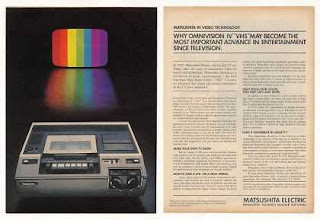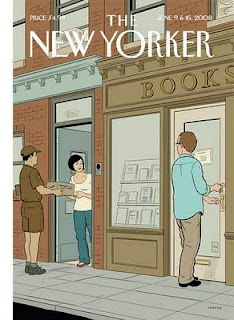Another mainstay of my early adulthood seems to be going, going gone. On the way up High St. to church this morning, I passed the Blockbuster store at High and Hudson Sts., and there was a giant GOING OUT OF BUSINESS sign in the parking lot, and all the inventory was on sale.
I can’t remember the last time I rented a video. During the last few years, I’ve mostly borrowed them from the public library, because the wait is well worth the money I save by doing so. (It’s very rare that I’ll go to a first-run movie. The last two first-run movies I’ve seen are Zodiac and Howl. This year, it will definitely be The Conspirator.) I would try renting from Netflix, but their pushiness when it comes to advertising has been a turn-off for me. They definitely have a product I would use, but seeing their ads pop up all over my laptop screen has the opposite effect.
Much like other technology, I was a latecomer to the world of videotape. I bought my first VCR from my friend Ivan at Ohio University in the spring of 1987. He owned a Panasonic OmniVision which his parents gave him as a Christmas present when he was still in high school. Ivan was, like many students, desperate for money once spring rolled around, so he sold me his ancient top-loader.
 |
| My first VCR. Since I’ve never had a first car, I’m likely to be more sentimental about this.
In 1987, it was not common for all homes to have a way to record television shows. Only the newer dorms (the ones on New South Green) were wired for cable in the individual rooms, and Athens was in a valley, so getting TV signals out of the air was next to impossible. This meant I was making many trips to the video store on Stimson Ave. once I hooked the OmniVision up to my black-and-white TV. I showed my friends the standard issue, such as the Star Trek movies, but used it also as a chance to show some of the classics of many genres.
That summer, I lived in a rented room above the Dairy Barn in Carthage, a neighborhood in the Mill Creek Valley just north of Cincinnati. I was working (too few) hours as a typesetter at Feicke Web, producing the Homefinder magazine, a journal of real estate listings, and The Woman CPA, a trade publication. As soon as I was settled in my new summer quarters, I joined the fledgling video club at the convenience store a few blocks down. After work, I usually stopped there to pick up my usual dinner fare–a pound of cold meat, three cans of beer, and a loaf of bread. Their selection of movies consisted mostly of action films–Chuck Norris, Schwarzenegger, the various Rambo and Rocky pictures. Occasionally, when I plowed through the detritus, I found occasional gems. This store was where I first rented Stand by Me and Psycho III.
By the time I had returned to Athens that fall, one of my friends had bought a VCR as well. I went to Radio Shack and bought a set of patchcords, so if one of us had a movie that we wanted to own permanently, that meant we’d bring the two machines together and dub them onto blank VHS tapes. (We knew there were criminal penalties for doing this. How much did we respect this? When showing movies in my room, a pre-movie ritual was everyone reading the warning aloud as it scrolled up the screen. Occasionally, I would dub laugh tracks onto the warning. I thought the worst-case scenario was brief incarceration in one of the minimum-security prisons with the golf courses and tennis courts.)
I’ve owned and worn out several VCRs in the meantime, both in my bachelor days and during my marriage. I have narrowed down my collection of VHS tapes considerably, and finally own more DVDs than I do tapes. I should probably shell out a little money to get the equipment to convert VHS to DVD, but it’s been on my “to do” list for quite some time. (Yesterday, I mailed a VHS tape of the movie That Kind of Woman–based on a short story by my friend Robert Lowry–to a friend in Cincinnati so he could convert it to DVD for me.)
When I lived in Cincinnati, I very briefly considered buying a Beta video recorder. It was at a yard sale, on sale for about $2, and Beta tapes occasionally still appeared at junk stores and library discard sales. (This was when I was first becoming interested in old-time radio, and saw people ecstatic over getting three-record sets such as National Anthems of the World and pro-Bund propaganda broadcasts of the 1930s.) In some rare self-restraint, I opted not to, although I once had a Betamax ad hanging in my bedroom as a kid:
I knew it was unrealistic to expect our family to buy a Betamax–not where my father considered trips to the doctor and dentist unnecessary luxuries–but I loved an ad that acknowledged people who loved to watch late movies on TV, as I did at the time.
In the pre-Internet area, I frequently baffled the clerks at the Blockbuster stores in both Cincinnati and Columbus with my requests for odd titles. Many stores provided PhonoLog listings of tapes that were available, and I would go through them whenever new pages arrived, looking in vain for B-movies I vaguely remembered from Channel 3’s All Night Theater when I was a teen. (That Kind of Woman has yet to be released as a DVD or tape. I obtained my copy only after joining a Sophia Loren fan club through Yahoo!Groups, and someone there was nice enough to dub me a copy.) Even the older clerks and cashiers were completely baffled when I asked if they could order Gene Tierney in Whirlpool or James Stewart in Call Northside 777.
One industry that home video practically destroyed was the pornographic theater. I live in Weinland Park, and it is close to the one- or two-block stretch of High St. called the Garden District, so named for the now-vacant Garden Theater, which was an X-rated movie and burlesque establishment. When home video became the norm, people could watch their smut in the privacy of their own homes, and not have to feel embarrassed when a friend, employer, or clergy person saw them coming out at the end of the show.
When I lived in Boston, the one section of town I tried to avoid was The Combat Zone, on the edge of Chinatown and near the Tufts Medical Center. As you can read here, I was wise to do so. (I wasn’t always 100% successful. Since I had no medical insurance with my job at The Harvard Crimson, I often went to the Medical Center’s free clinic whenever I needed to see a doctor.)
Arriving in Boston very low on money, but very much full of piss and vinegar, I decided to jump into freedom and independence with both feet, and applied for a job as a cashier and clerk at a smut bookstore on the edge of the Zone. (I stopped in after an appointment at the Tufts Medical Center.) The owner was straight out of central casting. He wore a shirt that may have been white when Woodrow Wilson was President, a green eyeshade, his sleeves were balled up around his elbows, and he had a cold cheap cigar hanging from one corner of his mouth.) I asked for a job application, and he passed me a clipboard and a ballpoint pen, I filled it out, and he hired me right on the spot, as long as I could pass a police check. (The Boston police was keeping an eye on the area for prostitution and drug trafficking. The outcry about bulldozing The Zone rose to high-decibel levels starting in 1976, when Andrew Puopolo, a Harvard cornerback, was fatally knifed outside a bar.)
I remember vowing to tell my dad that I had gotten a job “in a bookstore.” Since it was Boston, there were more bookstores than gas stations, so I didn’t need to elaborate on what type of bookstore it was. I was also relieved that my job did not involve mopping the floors of the private video booths in the rear, where you could spend a quarter to watch about 45 seconds of grainy 8-mm. smut footage. (The owner elegantly described my job: Keep the minors out, make sure the “jerk-off technicians” didn’t shoplift the merchandise, make sure no drugs or child pornography were changing hands.)
But my career as a ground-level pornographer was not to be. A day or two after I was hired, the owner called me and asked if I could start the job that night. I said sure, but I was curious about the urgency, since I wasn’t supposed to start until a few days later. He was quite casual about why. The cashier who normally worked that night was shot the previous night during a robbery. Could I work his shift while he recovered?
Suddenly the minimum-wage job washing dishes in a Brookline delicatessen sounded so much better. I’m a zealous defender of the First Amendment, but being shot in a smut bookstore wasn’t as noble as publishing the Pentagon Papers.
The big question is what will occupy the soon-to-be-vacant Blockbuster site. I can tell by the building’s architecture that it was at one time an A&P, another dying breed. (The last one I saw was in Queens in the late 1980s. The Great Atlantic and Pacific Tea Company is no longer a corporate giant.) Vacant buildings are much more the norm than the exception in many commercial neighborhoods in Columbus, and it seems that many businesses disappear overnight. Denise’s Ice Cream, located in Clintonville, a place where I went with Susie and her friends many summer evenings after the pool, has closed. I learned about this only as Susie and I were headed north for choir practice at the Unitarian Church, and I happened to look out the bus window and saw a big FOR RENT sign in Denise’s front window.
The day the last brick-and-mortar bookstore closes will be a day when I will truly grieve. Borders’ Columbus stores are selling to the bare walls. Coming home from church today, I saw a guy on the corner of High and Henderson holding a big EVERYTHING MUST GO! sign for the Borders on Kenny Road. I am not as unhappy about the demise of McBookstores like Borders as I am about the small, privately owned stores. The New Yorker best illustrated the problem in this cover:
Cards on the table: Even as I take Amazon.com to task for driving so many independent book dealers out of business, before I began typing this entry, I ordered a second-hand DVD of Exorcist III from a dealer via Amazon.com, at a cost of about $3. The other side to this coin is the Website Abebooks, which has rescued many independent bookstores from total oblivion by expanding the customer base worldwide. Several bookstores who were barely breaking even from foot traffic saw profits skyrocket when they listed on Abebooks, when customers from around the country (or world) began ordering.
|




